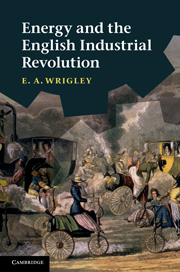Book contents
- Frontmatter
- Dedication
- Contents
- List of figures
- List of tables
- Acknowledgements
- Introduction
- PART I A sketch of the argument
- PART II Favourable developments
- Part III What set England apart from her neighbours
- 7 The timing and nature of change in the industrial revolution
- 8 Modernisation and the industrial revolution in England
- Part IV Retrospective
- Appendix
- Bibliography
- Index
8 - Modernisation and the industrial revolution in England
Published online by Cambridge University Press: 05 March 2015
- Frontmatter
- Dedication
- Contents
- List of figures
- List of tables
- Acknowledgements
- Introduction
- PART I A sketch of the argument
- PART II Favourable developments
- Part III What set England apart from her neighbours
- 7 The timing and nature of change in the industrial revolution
- 8 Modernisation and the industrial revolution in England
- Part IV Retrospective
- Appendix
- Bibliography
- Index
Summary
Introductory comment
It is frequently the case that discussions of the industrial revolution embody the assumption, either explicitly or implicitly, that there was a close association between ‘modernisation’ and the industrial revolution. The second is sometimes portrayed as, in effect, an aspect of the first. Modernisation is a term widely used by sociologists, economists, and historians to describe the transitional process by which traditional, largely rural society was replaced by an industrialised and urbanised successor. Industrialisation is then often treated as that aspect of the modernisation process which brings into existence the capacity to secure exponential economic growth. This in turn creates confidence that real incomes will rise into the foreseeable future, replacing the expectation that poverty is the permanent lot of the mass of mankind. This characterisation of the relationship between modernisation and industrialisation is unlikely to command universal assent, but it provides a convenient preface to a discussion of several aspects of the industrial revolution, and in particular to the question of whether modernisation, which is often regarded as a necessary condition for an industrial revolution, is also a sufficient condition for it. It also affords a convenient background to a discussion of what was common to the experience of England and the Netherlands, which for so long provided an exemplar to England in matters economic, and in what respects the two countries differed.
- Type
- Chapter
- Information
- Energy and the English Industrial Revolution , pp. 211 - 236Publisher: Cambridge University PressPrint publication year: 2010



